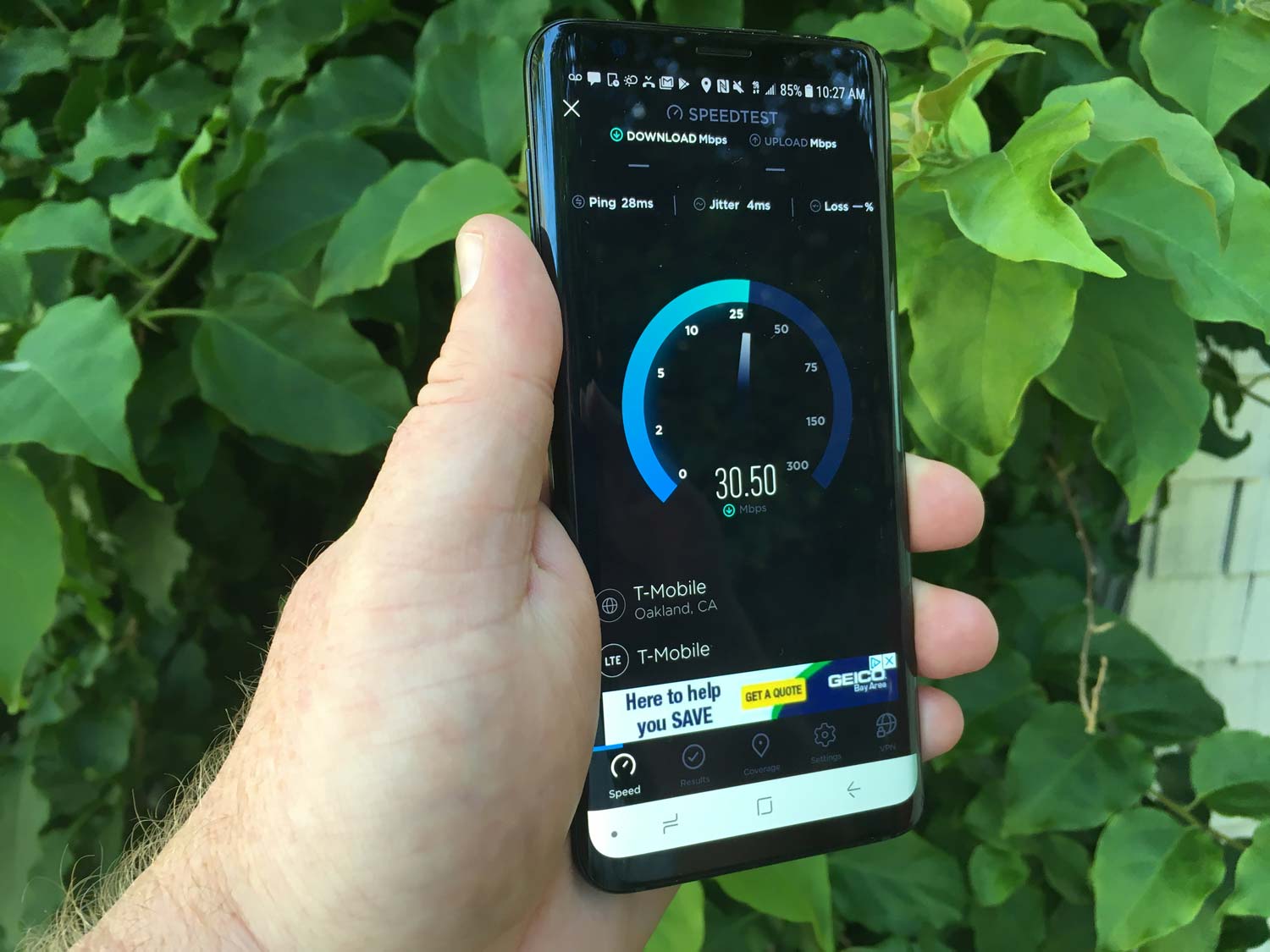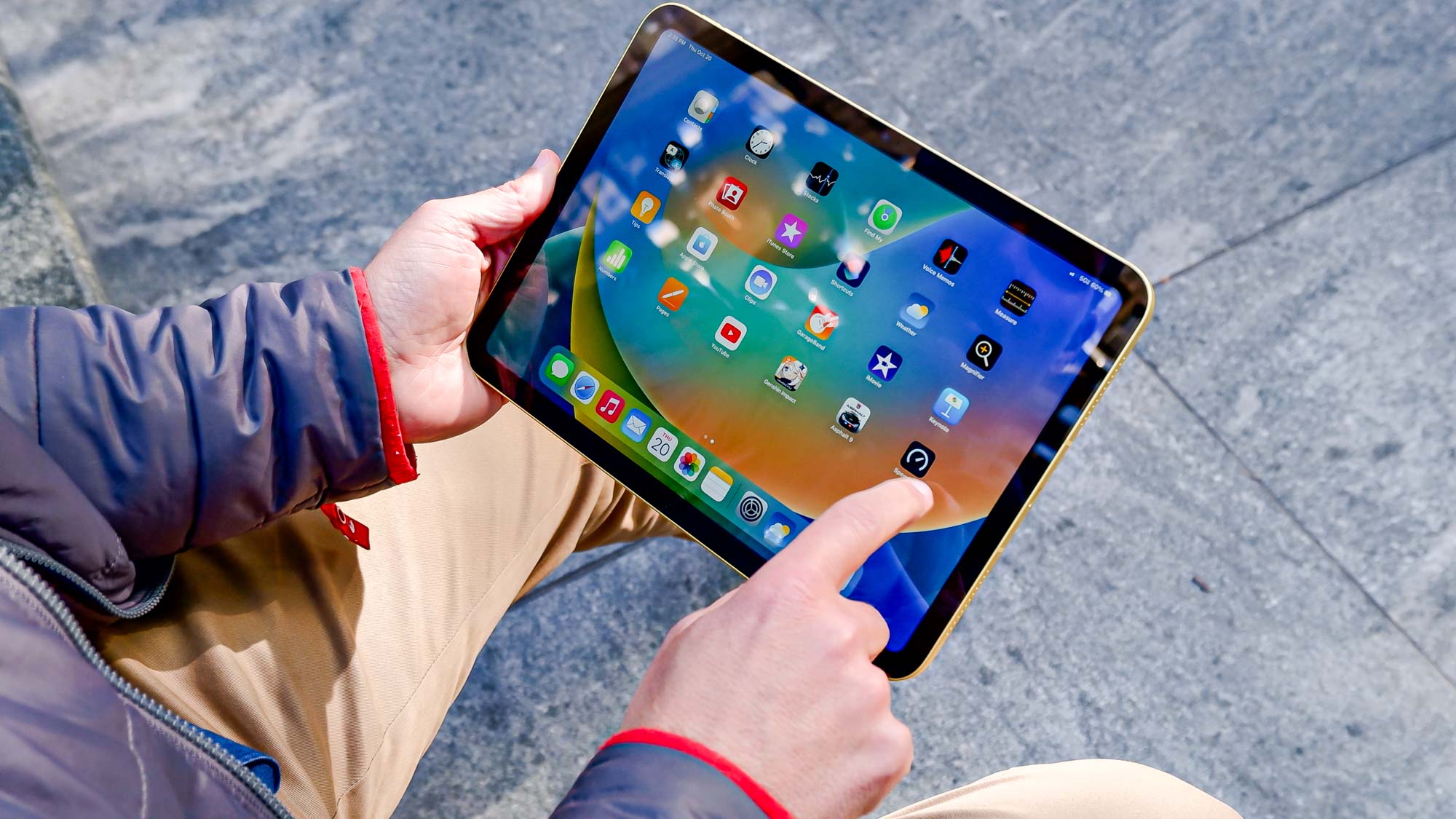Android Phones Obliterate iPhone on 4G Speed Tests
Qualcomm is touting new test numbers from Ookla that show phones with its modem outperforming devices that use Intel modems such as the latest iPhones from Apple.
The iPhone tops flagship Android devices in most performance metrics, save for one — the speed of its LTE modem. It's pretty well-established at this point that the top Android phones have faster 4G speeds than the iPhone, but new data pulled together by Qualcomm from a third-party testing firm shows how stark the gap can be.

An Android phone with the latest Qualcomm modem typically enjoys download speeds that are 40 to 68 percent faster than the iPhone, Qualcomm says, depending on the modem the iPhone's using and the network both phones are on.
That data comes from Ookla, a third-party testing firm that last week released a study on network performance for the first half of the year. As part of that report, Ookla included showing how the Galaxy S9 and iPhone X turn in different performance on the same cellular networks.
MORE: Best 4G LTE Speeds: Who's Fastest?
Qualcomm's not exactly a disinterested party here. As part of its Snapdragon mobile processing platform, it includes an LTE modem. In the case of the top-of-the-line Snapdragon 845 processor featured in phones like the Galaxy S9, OnePlus 6 and LG G7 ThinQ, that modem is the Snapdragon X20. The iPhone uses either an Intel modem or an older Snapdragon version.
Qualcomm took Oookla's data and drilled down a little further, isolating performance on phones that use the Snapdragon 845 processing platform, and those that have either an Intel XMM 7480 or XMM 7360 modem. (The former is found in the iPhone X, iPhone 8 and iPhone 8 plus, while the latter is found in the iPhone 7 and 7 Plus.) It then looked at how those respective devices performed on the networks of AT&T and T-Mobile since that's where you'll find phone with those types of LTE modems.
Qualcomm vs. Intel (AT&T)
Sign up to get the BEST of Tom's Guide direct to your inbox.
Get instant access to breaking news, the hottest reviews, great deals and helpful tips.
- Apple or Android, a fast VPN can help you avoid network throttling
| Modem | Download Speed (Higher numbers are better) | Upload Speed (Higher numbers are better) | Latency (Lower numbers are better) |
| Snapdragon 845 (X20) | 29.77 Mpbs | 7.04 Mbps | 35 ms |
| Intel XMM 7480 | 21.34 Mbps | 5.85 Mbps | 44 ms |
| Intel XMM 7360 | 18.16 Mbps | 4.98 Mbps | 48 ms |
Based on 570,000 user-initiated tests on Ookla, Qualcomm says that the Snapdragon phones had 40 percent faster download times than the Intel XMM 7480 modem. Download speeds were 64 percent faster over the 7360 modem. It was a similar story on T-Mobile, based on 480,000 user tests, where the Qualcomm modem outperformed the 7480 and 7360 by 53 percent and 68 percent, respectively, on download speeds.
Qualcomm vs. Intel (T-Mobile)
| Modem | Download Speed (Higher numbers are better) | Upload Speed (Higher numbers are better) | Latency (Lower numbers are better) |
| Snapdragon 845 (X20) | 37.17 Mbps | 11.1 Mbps | 26 ms |
| Intel XMM 7480 | 24.25 Mbps | 10.83 Mpbs | 38 ms |
| Intel XMM 7360 | 22.14 Mbps | 9.05 Mbps | 40 ms |
Upload speeds were faster, too, according to Ookla's numbers with the starkest difference occurring in what Qualcomm described as worst-case scenarios, when overall network performance is at its slowest. In those conditions, upload speeds were anywhere from 97 percent to 192 percent faster on Qualcomm's modems versus Intel's devices.
"From a user perspective, if it's taking three times as long to upload a video to Instagram, that's a long time to wait," said Sherif Hanna, Qualcomm's director of product marketing.
Slow performance is felt beyond your phone, though. "The way LTE works, if a user is taking three times as long to upload something, they are hogging the airwaves basically and the network cannot use that chunk of airwaves dedicated to that user to serve anyone else until they're done," Hanna said. "The net effect of that is slow devices end up slowing down the network overall."
Qualcomm's message isn't a particularly subtle one here: if you're not happy with how fast your phone handles uploads and downloads, it may be the device and not the network that's to blame. According to Hanna, taking a phone with an Intel modem from AT&T to T-Mobile would give you an 8 percent bump in speeds; sticking with your wireless provider and switching to a device with a Qualcomm X20 modem would give you a 40 percent improvement on AT&T and 53 percent on T-Mobile.
Qualcomm picked an interesting time to highlight this data about LTE performance. Not only does the company find itself in a patent dispute with Apple, there are conflicting reports about Apple's plans for the modems in future iPhones. Depending on who you talk to, Apple either plans to stick with Intel, go with another supplier like MediaTek or develop a modem internally. Whatever Apple decides, these latest numbers highlight an area where the iPhone still falls short of its Android counterparts.
Philip Michaels is a Managing Editor at Tom's Guide. He's been covering personal technology since 1999 and was in the building when Steve Jobs showed off the iPhone for the first time. He's been evaluating smartphones since that first iPhone debuted in 2007, and he's been following phone carriers and smartphone plans since 2015. He has strong opinions about Apple, the Oakland Athletics, old movies and proper butchery techniques. Follow him at @PhilipMichaels.
-
zofryer "The iPhone tops flagship Android devices in most performance metrics" No. It actually doesn't. But for whatever reason, the tech media spreads that fable for them.Reply

